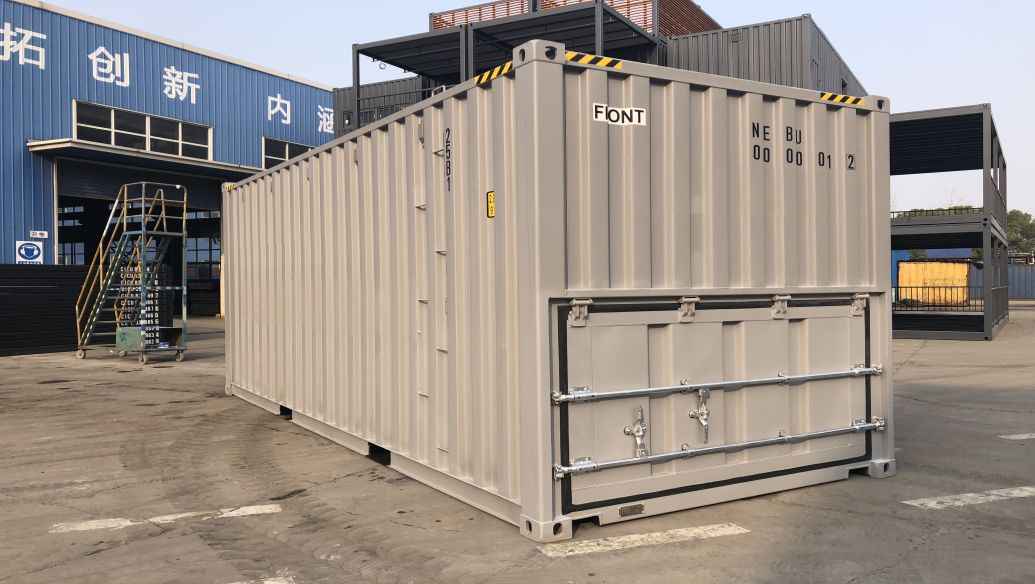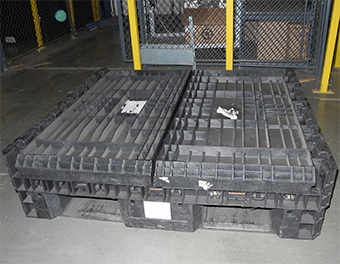Just How Mass Containers Can Improve Performance in Your Packaging Workflow
Mass containers play an important role in maximizing product packaging operations. Their layout enables much better use upright area and advertises arranged inventory management. This efficiency brings about decreased product replenishment frequency and lower labor costs. Additionally, the longevity of these containers lessens item damages. As organizations look for ways to enhance their processes, recognizing the multifaceted benefits of bulk containers becomes essential. What various other benefits might they offer the table?
Streamlined Storage Space Solutions
As business seek to enhance their operations, streamlined storage space options have ended up being important for boosting product packaging efficiency. Efficient storage not only saves room yet also facilitates quicker accessibility to products, which is essential in busy manufacturing settings. Mass containers, made for simple stacking and organization, considerably lower the intricacy of storage systems. They enable services to take full advantage of upright room while reducing the impact required for stock.
Furthermore, these containers often feature ergonomic designs that simplify handling and transport, decreasing the risk of injury and boosting process. By settling products in mass containers, firms can lower the regularity of restocking and improve their supply chain processes. Generally, the execution of reliable storage options cultivates an extra well organized work space, leading to increased productivity and lowered functional expenses. With thoughtful design and strategic usage of mass containers, services can accomplish notable improvements in their product packaging procedures.

Waste Decrease and Sustainability
While the pursuit of performance frequently drives product packaging decisions, waste decrease and sustainability have become important factors to consider in modern procedures. Companies progressively acknowledge that embracing bulk containers can considerably decrease material waste. These containers usually utilize less product packaging product than typical approaches, causing a smaller carbon impact.
Moreover, bulk containers can be recycled numerous times, which further reduces the demand for single-use packaging and lowers overall waste entering garbage dumps. Their style usually enables simpler recycling processes, aligning with sustainability objectives.
In addition, business that prioritize waste reduction can enhance their brand reputation, interesting environmentally aware customers. By implementing bulk containers, organizations not just enhance procedures but also contribute positively to environmental stewardship. This dual advantage of functional performance and sustainability positions business positively in an affordable market progressively concentrated on environment-friendly practices.
Enhanced Setting Up Line Effectiveness

Implementing mass containers on assembly lines considerably boosts performance by improving the handling and transport of materials. By utilizing mass containers, producers can lower the regularity of material replenishment, allowing workers to concentrate on assembly jobs as opposed to constant stock monitoring. This results in less disruptions and a smoother workflow, ultimately boosting productivity.
Furthermore, bulk containers are made for very easy combination with automated systems, better enhancing the setting up procedure. Their standard shapes and sizes assist in better organization, allowing workers to find and accessibility materials swiftly. This decrease in search time adds to a more fluid manufacturing setting.

Cost Cost Savings and Boosted Earnings Margins
Remarkable cost savings can be understood with the fostering of bulk containers in packaging procedures. By lowering the requirement for several smaller plans, companies can lower material expenses notably. Bulk containers often need much less product packaging product on the whole, resulting in reduced expenses on products. In addition, the efficiency of bulk handling reduces labor prices related to packing and unpacking, better improving financial savings.
Fewer journeys to suppliers and decreased transport expenses are also vital benefits, as bulk containers permit for boosted product ability per shipment. This higher quantity not only reduces shipping expenditures but likewise optimizes storage area within centers, resulting in enhanced supply administration.
In addition, the longevity of mass containers typically equates to reduce damages rates throughout handling and transportation, preserving product honesty and decreasing waste. Jointly, these variables add to enhanced profit margins, making bulk containers an economically beneficial option for companies seeking performance in their product packaging operations.
Convenience Across Industries
Bulk containers offer impressive convenience throughout various industries, making them an important property beyond just cost savings. In the food and beverage sector, these containers assist in the safe transport and storage of large quantities of ingredients, boosting effectiveness in assembly line. In drugs, bulk containers assure conformity with strict hygiene requirements while accommodating the mass handling of raw products. The chemical sector likewise benefits, as these containers stand up to extreme substances and protect against contamination, supporting secure operations. used bulk containers. Furthermore, the farming industry makes use of bulk containers for delivering fertilizers and grains, decreasing and maximizing logistics waste. Their versatility encompasses manufacturing, where mass containers improve setting up procedures and decrease the need for extreme product packaging. This cross-industry functionality not only boosts operational effectiveness yet additionally refurbished bulk containers promotes sustainability with lowered product packaging waste, highlighting the integral role bulk containers play in contemporary supply chains
Regularly Asked Inquiries
How Do Bulk Containers Effect Worker Safety And Security in Packaging Operations?
Mass containers considerably improve worker safety and security in packaging procedures by reducing hand-operated handling, lessening injury threats, and promoting ergonomic techniques. Their layout facilitates safer transportation and storage, ultimately developing an extra protected workplace for all employees.
What Products Are Bulk Containers Usually Made From?
Bulk containers are typically made from long lasting materials such as high-density polyethylene, metal, timber, or polypropylene - refurbished bulk containers. These products supply toughness, resistance to ecological aspects, and suitability for different components, making sure safe and effective transport of goods
Can Mass Containers Be Customized for Particular Products?
Yes, bulk containers can be customized for details items. Producers frequently customize dimensions, materials, and features to satisfy unique demands, guaranteeing excellent security and performance throughout storage space and transport of various goods.
Exactly How Do Mass Containers Affect Transport Logistics?
Mass containers enhance transportation logistics by maximizing freight area, lowering the number of trips needed, and lessening taking care of expenses (refurbished bulk containers). Their standardized measurements facilitate efficient loading and unloading, eventually bring about boosted operational effectiveness throughout the supply chain
What Is the Lifespan of Mass Containers in Normal Use?
The lifespan of bulk containers in normal usage commonly varies from five to 10 years, depending on worldly top quality, handling techniques, and environmental conditions. Appropriate maintenance can greatly extend their usability and performance.
Carrying out mass containers on setting up lines substantially improves performance by streamlining the handling and transport of products. Mass containers usually need much less product packaging material in general, resulting in lower expenses on materials. In drugs, mass containers assure compliance with stringent hygiene requirements while accommodating the mass handling of raw materials. Their flexibility expands to manufacturing, where mass containers streamline setting up procedures and minimize the demand for excessive packaging. Mass containers significantly improve staff member safety and security in product packaging procedures by decreasing hands-on handling, minimizing injury threats, and advertising ergonomic techniques.